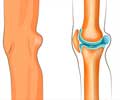The surgical outcome of partial knee replacement surgery has been has been found to be better owing to superior accuracy of robot assisted knee surgery compared to conventional surgery.
The surgical outcome of partial knee replacement surgery has been has been found to be better owing to superior accuracy of robot assisted knee surgery compared to conventional surgery, according to a latest study by researchers from Imperial College London.
The research team, headed by Professor Justin Cobb and his surgical team set to examine the surgical outcome of patients who underwent partial knee replacement surgery (unicompartmental), assisted by Acrobot, a robotic assistant that enables the surgeon to line up knee replacement parts with the existing bones.A total of 27 patients included for the study were randomized into two groups, the experimental (13) and control group (14). The control group patients underwent conventional surgery while the other underwent robot-assisted surgery. More accurate lining up of replacement knee parts were found in those under the experimental group.
In addition, robotic assisted surgery was associated with a prolonged surgical duration. A two-degree precision was noted in the accuracy of fixation related to the planned position. This was possible only in 40% of conventional surgeries. The incidence of surgery related side effects was significantly lower in robotic surgery, where an improved post-operative recovery was noted.
'These robots are designed to hold the surgeon's hand in the operating theatre, not take over the operation. This study shows they can be an enormous help, preventing surgeons from making mistakes. More importantly, by showing how the increased accuracy makes a difference to how well a knee works after surgery, we will be able to develop a new generation of less invasive procedures without the risks of error, providing faster recovery and better functional outcomes for patients, ' said Dr. Cobb.
The findings of the present study can have valuable implications on the surgical outcome of knee replacement surgery as enhanced accuracy ensures improved function and longevity of the replacement, eliminating the need for further medical interventions.








